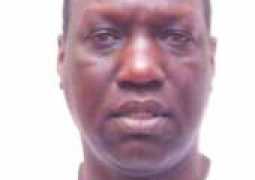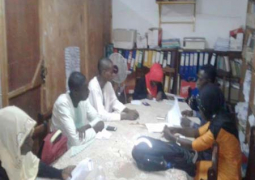So
Far, Is The National Assembly Failing Us?
In
our democracy the most powerful institution with the greatest responsibility by
law is the National Assembly. When one assesses the constitutional functions
and relationships of our institutions, it is clear that the institution that
stands above all else is the National Assembly. Apart from its law-making
function, there are multiple places in our constitution that empowers the
National Assembly to advise, monitor, review, approve, disapprove reports,
budgets and public servants and institutions or even dismiss practically any
public officer including the president.
Section
63(3) gives power to parliament to sack the president by a vote of no
confidence. Section 67 also gives power to parliament to sack the president by
impeachment. Section 75 gives power to parliament to censure ministers and the
vice president for their poor performance, abuse of office or misconduct. The
whole of Section 77 gives power to parliament to call the president, vice
president and ministers to answer to questions. Section 102 gives power to
parliament to receive and review government reports and also advise the
president on his responsibilities.
From
these powers and many more, it is clear that the National Assembly is the
primary institution that is responsible for the good governance and sustainable
development of the Gambia. If there is corruption, instability and poor public
services, it is because the National Assembly has failed to stand up to do
their job as required by law. This was how the APRC dominated parliament failed
the Gambia and we hope this new parliament does not become another dormant
parliament.
So
far there have been many issues for which one would expect the National
Assembly to assume its powers and address them. For example since Barrow
appointed ministers and heads of public institutions, one would expect the
National Assembly would invite each of these people one by one to tell the
parliament how they intend to run their institutions. Key among these
institutions is the Public Service, which is headed by the Secretary General.
We have seen the Secretary General Dawda Fadera insisting on SCOT or travel
clearance, which is utterly, counter productive and abusive. Yet the National
Assembly is silent when it is also clear that conditions of work are dire in
the civil service that needs urgent attention. The civil service is the
backbone of the nation hence the parliament should call the person in charge to
tell them how this civil service will be different from the Yaya Jammeh civil
service especially given that Fadera was part of the folks running that
terrible civil service.
We
have also seen the environmental damage caused by Golden Lead Factory in Gunjur
and Kartong, yet the National Assembly has not gone there publicly to see for
themselves. They have also failed to call the Director General of NEA Muhammad
Jama Suwareh or the Minister of Fisheries James Gomez or the Minister of Trade
Isatou Touray to answer to the concerns and issues of this company. Instead the
Ministry of Trade went ahead to allow this company to continue operations
against the advice of the NEA. Meantime the damage is public knowledge! Why?
Secondly,
we have witnessed riots in Farato, Sibanor and Kanilai yet the National
Assembly has not called the Minister of Interior Mai Ahmad Fatty to ask him why
those incidents happened and how his office handled and is handling these
cases. We just saw Mr. Fatty issue public statements but the parliament is yet
to hold him to account. At the same time, the presence of the Gambia National
Army in Kanilai requires that the CDS Masanneh Kinteh be called to parliament
to testify on the status of his forces in that village and around the country.
This is apart from the fact that some former soldiers are being recalled back
to the army while others are on the run. What is happening and what explanation
does the CDS have?
We
have also seen the issue of Gambian youths returning from Libya in droves yet
the parliament has not invited the Minister of Youth Henry Gomez to tell us how
his ministry is managing these hapless, unemployed and poor youths. Meantime
the Minster of Foreign Affairs Ousainou Darboe has led many missions abroad,
sometimes with the president and other ministers. But the parliament appears
not to follow up to know what has been the outcome of these foreign trips to
determine their cost and benefit to the Gambia. The parliament needs to hold
public hearings on these issues so that the general public knows what is being
done in our name.
Sometime
ago the Minister of Finance Amadou Sanneh had released some information on the
illegal financial transactions of Yaya Jammeh but the parliament is yet to
follow up publicly. The Minister of Justice Aboubacarr Tambadou has appointed a
special prosecutor as well as announced the freezing of the assets and accounts
of Yaya Jammeh, but we have not seen the parliament call him to explain the
real issues involved and the way forward. The country is currently facing
severe utility supplies but the Director General of NAWEC Baba Fatajo and the
Minister of Energy Fafa Sanyang have not been called to explain to Gambians why
this is the case. A press release from NAWEC is not enough. Parliament must ask
him the right questions for more details as to their real challenges and what
needs to be done.
Above
all, we are now going into the fifth month of Adama Barrow’s administration yet
there is no Vice President. The parliament has powers to solve this issue but
it has decided to keep mute. In addition, Barrow has not provided any policy
direction in speech or document to show how he intends to run the Gambia, yet
the parliament sits there without asking Barrow to come to the parliament to
answer to these pertinent questions. Many decisions and actions are being taken
and Gambians do not know the background or objectives, and it is only the
parliament that can help us get to the bottom of things. But they decide to be
silent!
Is
this how the parliament want to live their lives? We have so much expectation
on this parliament and indeed they are more than qualified to address these
issues yet they have decided to take a back seat when they have the powers to
act. Why are they silent? The parliament must know that only they can make the
government transparent, efficient, accountable and responsive if they do their
job well. The parliament must recognise that they are not there to serve the
president. The parliament is not secondary to the Executive. Rather they have
equal power and responsibility as the Executive and in fact they hold more
power than the president.
The
National Assembly has 12 select committees that touch on all the issues
highlighted above. Yet these committees that are in fact the working legs of
the parliament refuse to do what they are supposed to do. We expect that the
parliament will initiate public hearings so that public officers and common
citizens can openly speak to issues for the betterment of the Gambia. This will
help to strengthen accountability and also encourage citizens to be interested
and active in national affairs.
Public
hearings are fact-finding measures that help to expose or prevent poor
performance, abuse of power and corruption within the government and society.
Public hearings seek to control and contain public officers to realize that
they are mere servants of the people and that they have a duty to deliver.
Public hearings make citizens see and feel democracy at work and therefore
generate their interest and involvement in national issues. Because public
hearings are preventative, they therefore help to avoid serious damage from
occurring in the first place, which could lead to prosecution. Above all public
hearings are an accountability exercise that further strengthens democracy,
good governance and development.
Since
the April election, the National Assembly has not been fully and proactively
responding to issues of national importance, as they should. Yet issues are
boiling in the country.
This is not what we expect from them and they better assume their responsibility and make sure this country is safe and secure. Citizens are spending over D30, 000 on salaries, allowances and incentives for each parliamentarian, not to mention the amount of money we spend to maintain that huge building daily. Yet the National Assembly appears to have forgotten where we came from and where we need to go. If the Gambia fails, no one is responsible other than the National Assembly.
God
Bless The Gambia.




